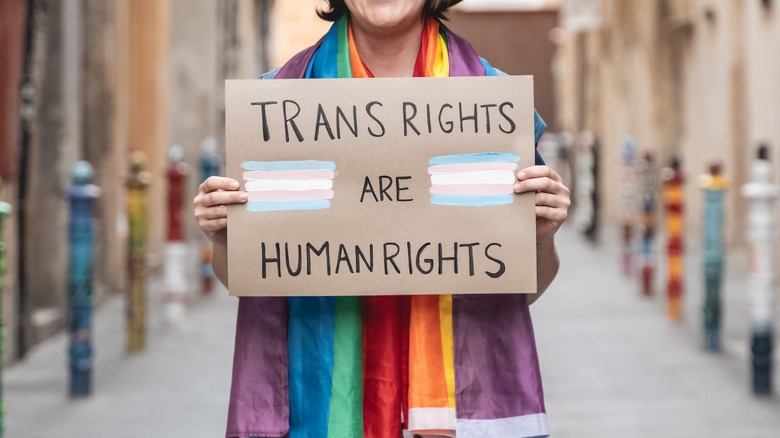What To Know About Alabama's New Law Criminalizing Gender-Affirming Healthcare For Trans Youth
Gender-affirming care helps support a person's outward appearance to reflect their inner identity and can range from mental health services to procedures like laser hair removal, speech therapy, hormone therapy, and surgery (via WebMD). The power of gender-affirming care has been substantiated by plenty of research showing that it helps to significantly improve the mental health, self-worth, and quality of life of transgender and nonbinary youth, per The Trevor Project.
This model of care is not only supportive of young transgender people but is also vital for their well-being. The Trevor Project reports that transgender and nonbinary youth are 10 times more likely to experience anxiety and depression. They are also 54% more likely to consider suicide and 29% more likely to attempt it.
In a recent court filing, the Pediatric Endocrine Society stated, "Gender-affirming care, including puberty suppression and hormone therapy, is potentially lifesaving," (via American Civil Liberties Union). Unfortunately, the rights of transgender and nonbinary youth are under attack, as Alabama has now made it a felony for providers to offer this life-saving healthcare.
Gender-affirming healthcare is now a felony in Alabama
Upon signing the bill barring providers from offering gender-affirming care, Alabama Governor Kay Ivey shared her personal justification of the matter stating, "I believe very strongly that if the Good Lord made you a boy, you are a boy, and if he made you a girl, you are a girl. We should especially protect our children from these radical, life-altering drugs and surgeries when they are at such a vulnerable stage in life," (via The Hill).
What Ivey and the state of Alabama fail to realize, however, is that gender-affirming care is not necessarily permanent. It can be as simple as a kid talking to a therapist about changing their hair or clothing to create an outward appearance that corresponds with their inner identity (via Healthline). It can also mean a doctor prescribing reversible, puberty-blocking medication so a young teen can take the necessary time to consider their gender identity and what feels best for them, per Healthline.
Unfortunately, the freedom for young people in Alabama to explore their gender identities has been stolen, thanks to this new law that healthcare professionals are calling dangerous and potentially deadly. Dr. Joshua Safer, professor of medicine at Mount Sinai told Healthline, "Denying access to healthcare for anyone carries predictable harm, especially when targeting vulnerable young people like transgender and gender diverse teens. It raises the risk of suicidal ideation and self-harm, along with increasing the risk of more invasive medical intervention later."


